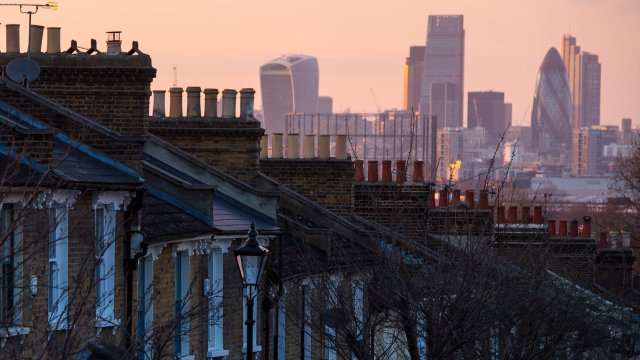
Retirees who continue to rent in their retirement will need a pot of over half a million pounds to fund even a ‘moderate retirement’, according to new analysis.
It comes as interest rates hit 4.5 per cent as inflation is still in double digits. Figures compiled by pension consultants Lane Clark & Peacock (LCP) show that renters in retirement will need a quarter of a million pounds more than an owner-occupier.
If housing costs are ignored, someone with a pre-tax income of around £26,000 per year will be able to afford a ‘moderate’ standard of living, according to the Pensions and Lifetime Saving Association (PLSA).
This is a benchmark the association uses and means the retiree will be able to enjoy more flexibility and financial security than someone with a more basic retirement.
For example, someone with a ‘moderate’ retirement could afford help with maintenance and decorating, a couple of weeks of European holidays per year and a three year-old car that is replaced every ten years, whilst a retiree with a more basic pension may not be able to run a car and have to do DIY maintenance.
To generate a guaranteed income of £26,000 throughout retirement – from a state and private pension – you would need a pension pot at retirement of around £348,000 according to LCP.
But this cost soars once rent is factored in, as their research shows the average rental cost for a two bed property is around £9,500 per year.
To generate this amount after tax would require a pre-tax income of around £11,900 and the pot size needed for this would be an additional £269,000.
This means someone who needed to fund an average rent on a two-bed property plus a ‘moderate’ standard of living would need a total pension pot of £617,000.
Figures calculated by PensionBee suggest that if someone were to realise at 40 that they were likely to need to rent during retirement, they would need to save an additional £7,320 per year into their pension to amass the extra £269,000, whilst they would need to save an additional £13,200 each year if they realised at 50.
Former pensions minister and LCP partner Steve Webb said the pensions world had “assumed” for a long time that most people in retirement would have paid off their mortgage, but this may not be the case in future.
“With younger generations finding it harder to get on the housing ladder, this could all change”, he said.
“Our research suggests the pension pot needed by someone who has to pay a regular rent out of their retirement savings will require a pension pot well beyond the reach of most ordinary people.
“It is vital that when we talk to people about their financial futures we look at their whole situation, including any housing costs in retirement, so that they can make realistic plans for the future”.
Research published by the Department for Work and Pensions (DWP) earlier this year confirmed that people who rent in retirement are at a higher-risk of not saving enough compared to those who will own their home.
It estimated that 45 per cent of owner-occupiers were not saving enough to hit the ‘moderate’ target, compared to 71 per cent of renters.
Cost of renting through retirement could hit £660,000 within two decades
The analysis from LCP comes after new research estimated that the cost of renting throughout retirement could hit as high as £660,000 in some parts of the UK by the 2040s.
Figures from Interactive Investor suggest that a woman retiring in 20 years and paying the average rent on a one-bedroom flat could expect to pay £377,000 from 66 onwards.
However, this soars when looking at London specifically where a woman living in a one-bedroom flat could be paying as much as £660,000.
Data from the Office for National Statistics shows that 29 per cent of 55 to 64 year-olds in England are renting and are on track to do so in retirement.
Over a third (34 per cent) of those aged 45 to 54 are renting compared to just 18 per cent in 2004.
Alice Guy, head of pensions and savings at Interactive Investor said there was a “whole heap of pain” heading for future retirees who could be renting in retirement.
“They could face an astronomical £377,000 average rental bill throughout retirement if they retire in the 2040s. Although housing benefit may cover some of these costs, there is often a significant gap, leaving many pensioners with a shortfall and a huge potential headache”, she said.
“Building wealth and financial resilience is a lifelong journey and missed steps along the way can have long-term consequences.
“The scary reality is that not managing to get on the housing ladder in your 20s, 30s or 40s may shape the kind of retirement you can expect in the future”, she added.
Several ways to boost your pension
There are several ways that people can boost their pension for retirement.
One of these is filling up any gaps in your National Insurance (NI) record. You can plug the gaps in your record by buying voluntary class 3 NI contributions, with a full extra year costing around £800.
For each year bought you get 1/35th of a year’s state pension – or around £275, meaning you effectively earn your money back in around three years.
Another method is checking if you can claim pension credit. It is estimated that over £15bn of government benefits go unclaimed each year, but if you do claim, it entitles you to other benefits as well.
These include help with council tax, a free TV licence once you turn 75, and currently, £900 cost of living payments.







